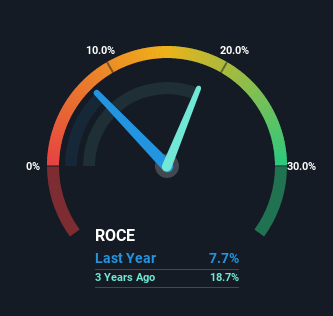- India
- /
- Auto Components
- /
- NSEI:ZFCVINDIA
Capital Allocation Trends At ZF Commercial Vehicle Control Systems India (NSE:ZFCVINDIA) Aren't Ideal
Finding a business that has the potential to grow substantially is not easy, but it is possible if we look at a few key financial metrics. Firstly, we'll want to see a proven return on capital employed (ROCE) that is increasing, and secondly, an expanding base of capital employed. Ultimately, this demonstrates that it's a business that is reinvesting profits at increasing rates of return. However, after briefly looking over the numbers, we don't think ZF Commercial Vehicle Control Systems India (NSE:ZFCVINDIA) has the makings of a multi-bagger going forward, but let's have a look at why that may be.
What is Return On Capital Employed (ROCE)?
If you haven't worked with ROCE before, it measures the 'return' (pre-tax profit) a company generates from capital employed in its business. To calculate this metric for ZF Commercial Vehicle Control Systems India, this is the formula:
Return on Capital Employed = Earnings Before Interest and Tax (EBIT) ÷ (Total Assets - Current Liabilities)
0.077 = ₹1.6b ÷ (₹26b - ₹5.0b) (Based on the trailing twelve months to March 2022).
Thus, ZF Commercial Vehicle Control Systems India has an ROCE of 7.7%. In absolute terms, that's a low return and it also under-performs the Auto Components industry average of 11%.
See our latest analysis for ZF Commercial Vehicle Control Systems India

While the past is not representative of the future, it can be helpful to know how a company has performed historically, which is why we have this chart above. If you'd like to look at how ZF Commercial Vehicle Control Systems India has performed in the past in other metrics, you can view this free graph of past earnings, revenue and cash flow.
What Does the ROCE Trend For ZF Commercial Vehicle Control Systems India Tell Us?
On the surface, the trend of ROCE at ZF Commercial Vehicle Control Systems India doesn't inspire confidence. Over the last five years, returns on capital have decreased to 7.7% from 21% five years ago. Although, given both revenue and the amount of assets employed in the business have increased, it could suggest the company is investing in growth, and the extra capital has led to a short-term reduction in ROCE. And if the increased capital generates additional returns, the business, and thus shareholders, will benefit in the long run.
The Bottom Line On ZF Commercial Vehicle Control Systems India's ROCE
While returns have fallen for ZF Commercial Vehicle Control Systems India in recent times, we're encouraged to see that sales are growing and that the business is reinvesting in its operations. Furthermore the stock has climbed 55% over the last five years, it would appear that investors are upbeat about the future. So should these growth trends continue, we'd be optimistic on the stock going forward.
One more thing to note, we've identified 1 warning sign with ZF Commercial Vehicle Control Systems India and understanding it should be part of your investment process.
While ZF Commercial Vehicle Control Systems India may not currently earn the highest returns, we've compiled a list of companies that currently earn more than 25% return on equity. Check out this free list here.
Valuation is complex, but we're here to simplify it.
Discover if ZF Commercial Vehicle Control Systems India might be undervalued or overvalued with our detailed analysis, featuring fair value estimates, potential risks, dividends, insider trades, and its financial condition.
Access Free AnalysisHave feedback on this article? Concerned about the content? Get in touch with us directly. Alternatively, email editorial-team (at) simplywallst.com.
This article by Simply Wall St is general in nature. We provide commentary based on historical data and analyst forecasts only using an unbiased methodology and our articles are not intended to be financial advice. It does not constitute a recommendation to buy or sell any stock, and does not take account of your objectives, or your financial situation. We aim to bring you long-term focused analysis driven by fundamental data. Note that our analysis may not factor in the latest price-sensitive company announcements or qualitative material. Simply Wall St has no position in any stocks mentioned.
About NSEI:ZFCVINDIA
ZF Commercial Vehicle Control Systems India
Engages in supplying systems for automotive and industrial technology in India and internationally.
Flawless balance sheet with proven track record and pays a dividend.
Similar Companies
Market Insights
Community Narratives




